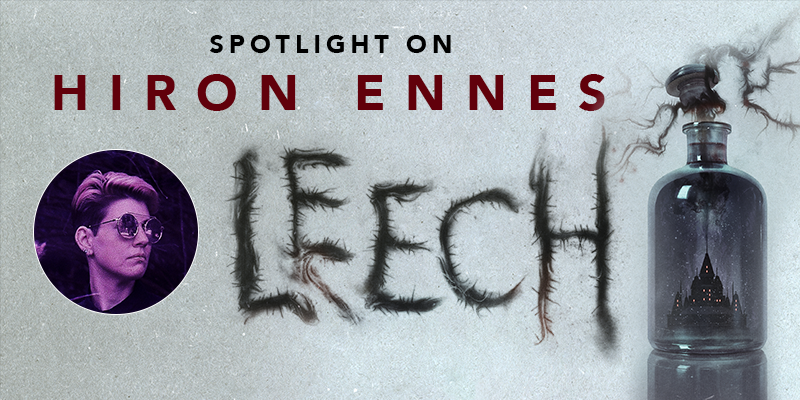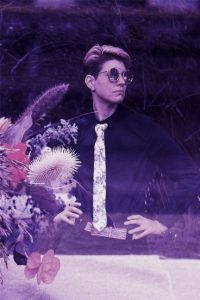Spotlight on: Hiron Ennes

HIRON ENNES is a writer, musician, and student of medicine based in the Pacific Northwest. Their areas of interest include infectious disease, pathology, and anticapitalist healthcare reform. When they’re not hunched over a microscope or word document they can be found playing in the snow or playing the harp (though usually not at the same time). They’re queer in every sense of the word, and they really want to pet your dog.
Leech is their first novel.
 Tell us about your debut novel, Leech—the world where it takes place, and the characters who inhabit that world.
Tell us about your debut novel, Leech—the world where it takes place, and the characters who inhabit that world.
I always have a hard time explaining Leech. I describe it as post-post-apocalyptic soft-sci-fi gothic body horror, and if you’re on board by the end of that, you’re on board. It opens in the frozen province of Verdira, ruled by a despotic baron whose personal physician has died under mysterious circumstances. We follow the doctor’s not-quite-human replacement, who must contend both with a spreading parasitic disease and the demands of the manor’s inhabitants: the baron, who is kept alive by a retinue of machines, his solicitous but overworked son, a daughter-in-law in a perpetual state of ill-fated pregnancy, two mischievous grandchildren, and a silent but hypercompetent houseboy. Leech has got all the good stuff. Autopsies. Parasites. Dogsledding. An isolated gothic manor with a bloodstained past. The technological and biological remnants of dead civilizations. You know, the usual.
Will you return to the setting of this novel in future work, or is it a standalone?
This one is definitely a standalone, at least for now. I have no plans for a sequel, but I think the world in which Leech takes place is much bigger than Verdira, both geographically and temporally. There are so many weird microclimates that could make a decent stage for a number of stories, none of which are connected to Leech but in the most peripheral way. My second novel could be interpreted as taking place in this world, but it doesn’t need to be. It’s a different era, and in a different place entirely.
You have a background in medical science. How does that experience and knowledge come through in your work?
Decently, I hope! There’s nothing that takes me out of a story more than seeing medical science applied ridiculously—unless for comedic or allegorical purposes (Dr. Benway massaging a patient’s heart with a toilet plunger will always be one of my favorite scenes ever written). But I also hope that Leech maintains its half-fantastical aura, keeping its medical oddities just unbelievable enough to be intriguing. I feel like a lot of what the narrative wants to say about medicine is not in the details of clinical practice, but in larger aspects of the medical-industrial complex: its rigid conformity, its use as a tool of colonialism, its hunger for knowledge and addiction to discovery, and its capability to commit great acts of evil as well as genuine, miraculous acts of good.
Leech is your first book. Can you describe your journey from aspiring writer to published author?
I don’t think the journey had a beginning. I’ve always been in a state of writing something. The first story I wrote was with the text option on Kid Pix 1.0. All through childhood I’d fill my school notebooks with fantasy inspired by Diana Wynne Jones. When I was 10 or 11, my grandfather gave me his old office typewriter, on which I clicked away nonstop—mostly aimless vignettes set on Arrakis, because I was obsessed with Dune back then and had no idea that fanfiction was a thing. From there it was pirate adventures, then these sort of tongue-in-cheek paranormal stories I’d write with my cousin. In high school I moved on to godawful ham-fisted dystopias, then in college, poetry (also ham-fisted). I have a trail of informal works behind me, the vast majority of which are unpublished—and should stay that way. Honestly, the only reason I find myself a published novelist now is because in college I lived in the basement of a lit professor who, when she saw I was in that post-graduation depression slump, suggested I busy myself with a novel-writing course. I wrote the first few thousand words of Leech for it, got some feedback, and at the end of the course practiced reaching out to agents. My manuscript got passed around and I got lucky. Really lucky. Now people expect things of me that are more substantial than silly Dune fanfiction and frankly it’s awful.
 Leech has been described as a combination of Gothic horror and science fiction. What works in the Gothic tradition influenced you, and what’s the appeal of Gothic fiction in the 21st century?
Leech has been described as a combination of Gothic horror and science fiction. What works in the Gothic tradition influenced you, and what’s the appeal of Gothic fiction in the 21st century?
I’m a sucker for the classics. In middle school I was very much into Dracula, Frankenstein, and The Phantom of the Opera—creepy houses and candelabras and the pathologically dysfunctional ruling class. I’ve seen Leech compared to Wuthering Heights, but I think the Brontë-ness might be aesthetic for the most part. A lot of the surrealist gothic flavor comes from Mervyn Peake, to be honest. I read his books so long ago that I’m fairly sure half of my memories of Gormenghast are actually dreams I’ve had about it, but that old house is still lodged deep in my brain, incorporated into my genome like a lysogenic virus.
I don’t think the 21st century will see the death of the genre. If anything, its themes are becoming more relevant, especially in a world where increasing inequity is only emphasizing the social cruelties often explored in gothic fiction—and on a global scale. There’s no shortage of heinous power dynamics, of vengeful ghosts or terrible families living insulated, haunted lives, and I doubt there ever will be. The setting may change with the trends in fiction; the spooky house may become a factory, or a small planet, or the virtual-reality corporate Teams chat that never quite lets you escape, but the heart of gothic fiction is still beating strong.
What other writers, inside and outside science fiction, influenced you? Have you always been a reader of speculative fiction?
I’ve always been a reader of pretty much everything, barring maybe romance and YA. If I could list the writers that have influenced me I’d be sitting here all day, but the ones that come to mind for Leech are of course those listed above—and a generous spoonful of Samuel R. Delany, China Miéville, and José Donoso. It would be remiss of me not to shout out my transgressive French boys too, who poisoned my adolescent mind so thoroughly I’m fairly sure my writing will never recover: Cendrars, Compte de Lautréamont, Barbusse, et al. At the moment I am desperately trying to be influenced by Sofia Samatar and her compassionate, gorgeous lyrical voice. We’ll see how that works out.
You sold Leech in a two-book deal. Can you give us any hints about the next novel?
Oh lord, the second book—embryonic at best—is at the moment a lush, weird high-society revenge story. It’s got swordfights and giant centipedes and drugs and opera—and now that I’m looking back over my list of influences, this is…hardly surprising. I tried to explain this novel to my cousin (the paranormal one) recently and stumbled into something like “surrealist anime art deco Alexandre Dumas but about that one pool boy from the Falwell sex scandal.” If I tried to describe this mess in any detail, it would be like someone rambling about a dream. It’s a work in progress. Who knows what it’ll turn out to be, but right now, it’s utter madness. I kind of love it. Which probably means my editor won’t.
Is there anything else you’d like our readers to know? Upcoming work or other projects of note?
I’ll be on tour for Leech in late September and early October. Some events in-person, some live. Follow me @hironennes on twitter for updates, and preorder Leech! My paranormal cousin says it’s an excellent book!






